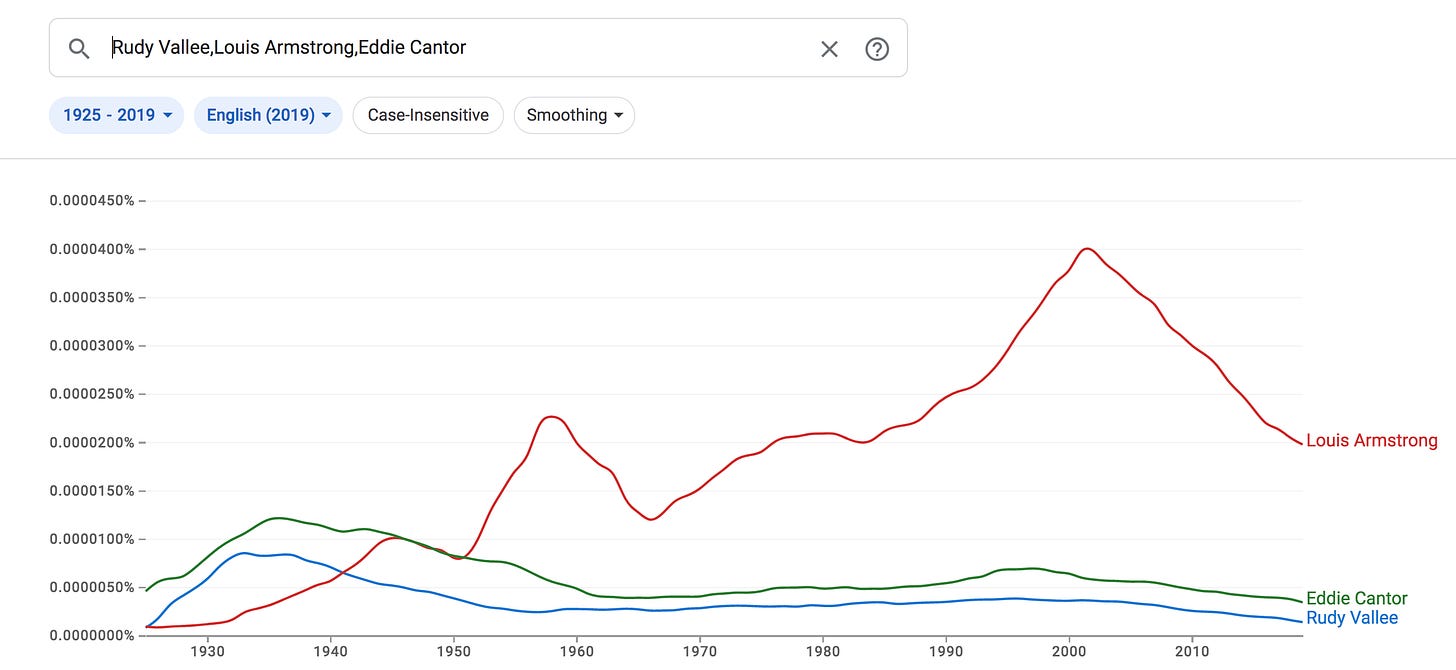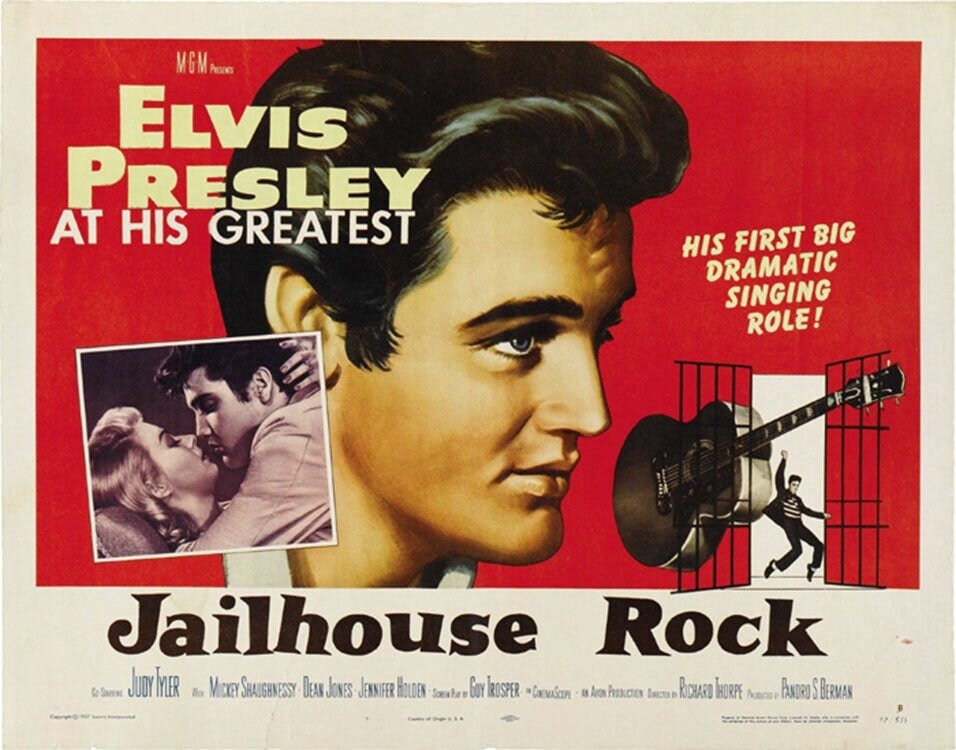How Long Does Pop Culture Stardom Last?
I have a hunch that even huge stars are forgotten after 80 years—but does the data back that up?
The first warning sign was when they renamed Bob Hope Airport.
Back in the 1940s, Bob Hope was the most popular comedian in the world. He was a radio star. He was a movie star. He would later become a TV star at NBC.
When Hope died in 2003, it made perfect sense to name the Burbank airport after him. After all, his longtime employer NBC was the best known company in Burbank, and Bob Hope had spent a half-century on the network—usually at the top of the ratings.
So the local airport got renamed.
But the only thing that lasts forever in pop culture is the fact that nothing last forever. By 2017, Bob Hope was only a dim memory at NBC, and young passengers flying to SoCal had no idea who he was. So they changed the name to the Hollywood Burbank Airport.
The Honest Broker is a reader-supported guide to music, books, media & culture. Both free and paid subscriptions are available. If you want to support my work, the best way is by taking out a paid subscription.
By coincidence this happened almost exactly 80 years after Hope rose to fame—when Paramount signed him to star in the film The Big Broadcast of 1938. In that hit movie, he sang his charming theme song “Thanks for the Memories”—which he kept singing until the end of the 20th century. Not long ago, everybody knew that song.
But then the memories ran dry.
I’ve long believed that 80 years is a typical span of pop culture fame for superstars. I’m referring to the biggest names—the lesser stars burn out in 80 months or 80 weeks or 80 days. But the top draws retain their fame for the entire lifetime of their youngest fans—and given current life expectancies of the US audience, that can’t be much more than 80 years.
We already see the price of Elvis Presley memorabilia starting to drop. The recent Elvis biopic might slow the erosion, but will never bring back the King’s red hot fame of the 1950s. By my measure, Elvismania will be officially dead in the year 2034. That will be the 80th anniversary of his first hit single “That’s All Right.” Almost none of his original audience will still be around to celebrate the anniversary, and that can’t bode well, even for the nostalgia crowd.
Some reputations do flourish after 80 years, but only because the entertainers somehow found an audience outside of pop culture. Louis Armstrong was famous as an entertainer during his lifetime, but enjoys posthumous renown as an artistic and cultural figure. Back in the 1920s, Rudy Vallée sold more records than Armstrong, but never made the transition outside of pop culture.
So let’s compare the trajectory of a pop culture career (Rudy Vallée or Eddie Cantor) with an artist’s career (Louis Armstrong). We will use Google Ngram trends as our measure—it captures how often a name is mentioned in print.
Here’s what it shows
Rudy Vallée and Eddie Cantor were huge pop culture stars in the 1920s, but nobody cares anymore. By comparison, Louis Armstrong’s fame is greater now than at any point in his life—but only because he built a reputation that eventually transcended pop culture and now resides in the realm of American history and timeless art. His music is taught at universities and studied in textbooks (including some I’ve written myself).
Maybe that will be Elvis’s destiny. Maybe not. Time will tell.
Let’s now take a look at the biggest movie stars—and we will focus on three different decades. First, let’s see what Google NGram has to say about the five Hollywood stars with the biggest box office draw in 1940. Bob Hope is also on this list—but is joined by Bing Crosby, Gary Cooper, Spencer Tracy, and Betty Grable.
Here, too, we see a few upward bumps—but after the 80-year mark, a terminal decline sets in. I love Gary Cooper and Betty Grable, but their pop culture fame is now dead and gone.
I note that Bob Hope did the best of any of the others here—mostly because he had the most success in transitioning to TV. And Hope got a very nice bounce around the time of his death in 2003, but it didn’t last long. He was Hollywood royalty when he filmed Road to Morocco, the top-grossing comedy of 1942, but eighty years later, he’s on the road to oblivion.
By the way, I note that Bing Crosby has gained posthumously on his frequent costar Bob Hope (or rather has lost his luster at a slower pace). Why has he fare so well? Perhaps it’s because he took the lead in the biggest change in American singing during the 20th century, which involved learning how to sing with a microphone.
By my measure, Bing did more to extract the artistic potential of this technology than anybody else in the world. In the aftermath of his breakthrough recordings of the late 1920s and early 1930s, almost everybody learned from his example. Singers no longer shouted and emoted and grandstanded—well, at least not so much. You could say that the entire culture shifted because of Bing Crosby. You might even say that the American personality changed because of him. That gives his legacy a historical weight that operates outside of pop culture. He was more than just a recording artist with a lot of hit records, and that might be enough to save him from the irresistible cultural amnesia.
Once again, this helps us figure out how Elvis might escape cultural oblivion. Did he have a comparable effect on American culture—transcending music and permeating the nation’s sense of self? Perhaps. And that might keep his legend alive.
This may even be the most likely scenario At least that would be my wager if I had to place a bet on Mr. Presley’s place in American culture, circa the year 2050. Under this scenario, my grandchildren will recognize Elvis as a meme and image—much like Charlie Chaplin or Albert Einstein—but won’t actually know any of his songs.
After all, you don’t have to study the theory of relativity to recognize Einstein. You don’t need to watch silent films to to recognize Chaplin. And you don’t have to care about “Jailhouse Rock” to recognize Elvis.
The fickleness of mainstream audiences gets even more obvious when we go back to the biggest stars of the 1930s.
Here, too, some Hollywood legends enjoyed a second wind of nostalgia—but once they reach the 80-year mark, they all start to sink into obscurity.
Do you notice how all the trendlines converge on their downward slope—but only after eighty years, more or less. That’s the way of all flesh, my friends. I might still have fond memories of Shirley Temple or Clark Gable, but it’s based on what I picked up from my parents. My grandchildren will have no idea who either of them are.
By the way, I have a hunch that Fred Astaire might linger on as a dance innovator and Will Rogers may get turned into a kind of Mark Twain-ish homespun philosopher. But in neither instance will their box office receipts of the 1930s be sufficient to keep their names alive.
Consider the case of the biggest star in American music in the late 1930s, a young man named Benny Goodman. For my father, who turned 18 in 1935, no musician had more star power or a larger audience. But how many people nowadays could identify the man in this photo?
He was at the top of the world in 1935 but not a single millennial could pick him out of a police line-up.
And now let’s turn to the 1920s.
Greta Garbo is the outlier here. Why is that?
I can only hazard a guess, but the most frequently quoted line from this starlet is her remark: “I want to be alone.” It came from a film, but was emblematic of her life. Garbo didn’t give interviews. She didn’t give autographs. She didn’t respond to fan letters. She never married or had children. Time magazine put her at number three in their ranking of the most reclusive celebrities of all time (only Howard Hughes and J.D. Salinger ranked higher).
Could it be that she survives pop culture fame because she never pursued it in the first place? I remember her for precisely that reason, almost as a symbol of reclusiveness and elitist disdain for fanatical fans and mass market obsessions. Perhaps others do too. By snubbing fame, she ensured her own.
At least for a while.
I doubt that even the great Garbo will retain her name recognition in mainstream culture for more than another decade or so. She will be like Sarah Bernhardt, who enjoyed more acclaim than any actress of the late 19th century, but now wouldn’t score 5% on a name recognition quiz. And many of the people who might claim to know her now would probably be confusing her with second-tier comedian Sandra Bernhard.
One last observation: Investment firms have recently paid huge sums to buy the rights to old rock songs, many of them from the 1960s and early 1970s. If I’m right about my 80-year theory, they better monetize that music as fast as possible. By my measure, they only have another 10-15 years, more or less, before the core pop culture audience loses interest in the vast majority of those tunes.
I suspect a few famous names will survive this cultural amnesia—but it will be a much smaller list than the huge song portfolios of those fund managers. Elvis is my test case. And even if he survives as a meme, will those songs still have any traction?
I wouldn’t bet the farm on it. And if the King is dead, what chance is there for the lesser nobles?










In my opinion the Beatles will survive this effect - at least what they made from 1965 on. Love the early stuff myself, but it's more a meme representing the '60s where the later stuff is pop as timeless art.
Not so sanguine about anyone else from the era. The Stones? Too tied to rock and blues, both of which are out of favour now. The Who? Too wild and improvisational - that's all out of vogue too. Hendrix? Too tied to the electric guitar, and most of his stuff's too abrasive and inaccessible for most listeners. Dylan? Extremely culturally important and innovative, but may well be remembered for historic rather than musical reasons ('Did you know there was a guy who wrote complex lyrics in the era *before* rap?').
These guys are all still respected, but they're not *worshipped* the way they used to be. It's always fascinating to me to read old articles and see just how venerated Dylan was by pretty much all the music writers of the day - they really thought each pronouncement came from a higher place and each new release signalled where the culture was going to go next. And he really was that influential at the time. But I'd argue that since his heyday his influence has been mostly indirect - he inspired people who inspire people.
It's a shame, because personally I love him just as much as all those Boomer writers of old.
As an Old Movie Weirdo, this makes me sad. I'm glad there are a few of us around to at least keep enjoying the old stars amongst ourselves.
I'm reminded of Robert Frost's "Provide, Provide" ("The witch that came (the withered hag)/ To wash the steps with pail and rag,/ Was once the beauty Abishag,/ The picture pride of Hollywood"). First time I read this as a kid, I thought "No way!" Now I believe it.